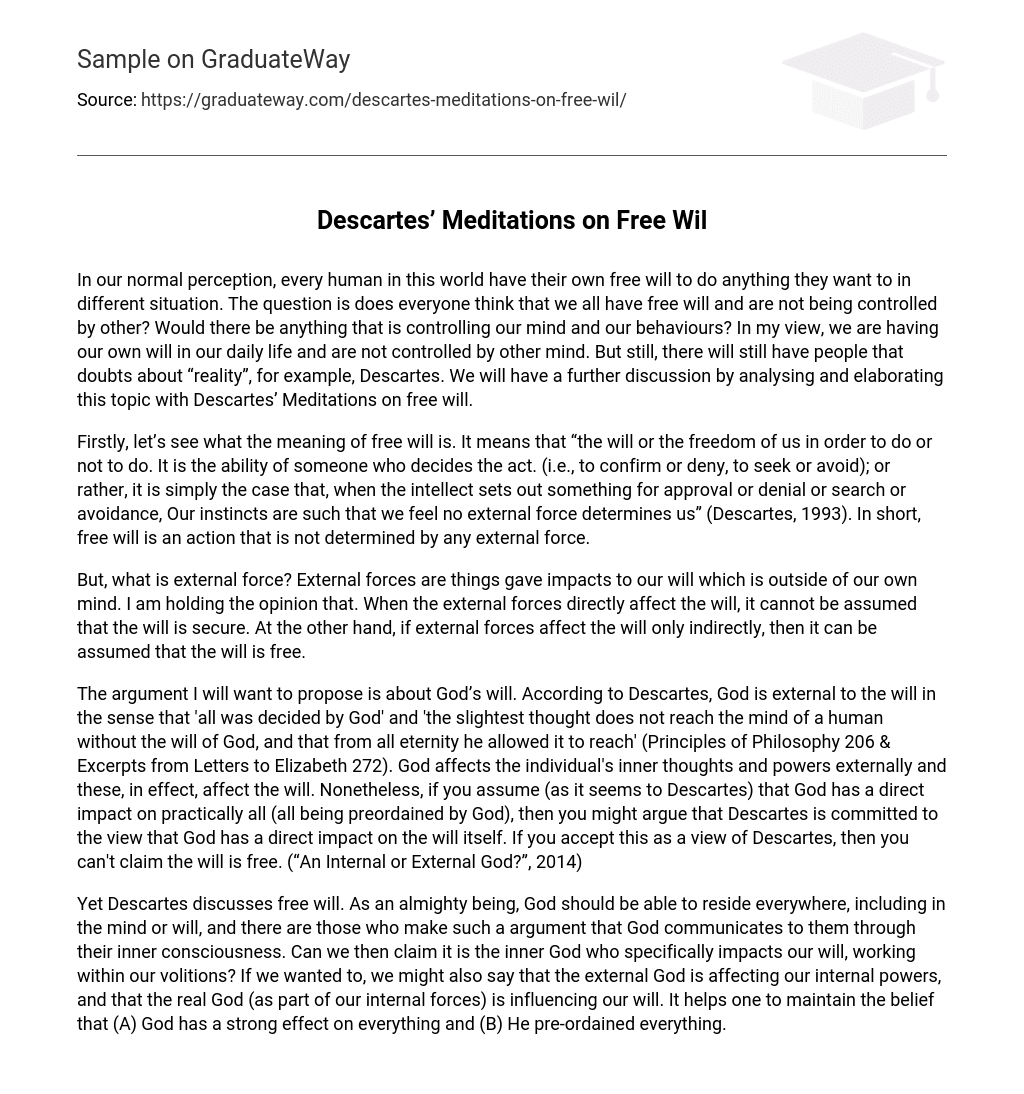In our normal perception, every human in this world have their own free will to do anything they want to in different situation. The question is does everyone think that we all have free will and are not being controlled by other? Would there be anything that is controlling our mind and our behaviours? In my view, we are having our own will in our daily life and are not controlled by other mind. But still, there will still have people that doubts about “reality”, for example, Descartes. We will have a further discussion by analysing and elaborating this topic with Descartes’ Meditations on free will.
Firstly, let’s see what the meaning of free will is. It means that “the will or the freedom of us in order to do or not to do. It is the ability of someone who decides the act. (i.e., to confirm or deny, to seek or avoid); or rather, it is simply the case that, when the intellect sets out something for approval or denial or search or avoidance, Our instincts are such that we feel no external force determines us” (Descartes, 1993). In short, free will is an action that is not determined by any external force.
But, what is external force? External forces are things gave impacts to our will which is outside of our own mind. I am holding the opinion that. When the external forces directly affect the will, it cannot be assumed that the will is secure. At the other hand, if external forces affect the will only indirectly, then it can be assumed that the will is free.
The argument I will want to propose is about God’s will. According to Descartes, God is external to the will in the sense that ‘all was decided by God’ and ‘the slightest thought does not reach the mind of a human without the will of God, and that from all eternity he allowed it to reach’ (Principles of Philosophy 206 & Excerpts from Letters to Elizabeth 272). God affects the individual’s inner thoughts and powers externally and these, in effect, affect the will. Nonetheless, if you assume (as it seems to Descartes) that God has a direct impact on practically all (all being preordained by God), then you might argue that Descartes is committed to the view that God has a direct impact on the will itself. If you accept this as a view of Descartes, then you can’t claim the will is free. (“An Internal or External God?”, 2014)
Yet Descartes discusses free will. As an almighty being, God should be able to reside everywhere, including in the mind or will, and there are those who make such a argument that God communicates to them through their inner consciousness. Can we then claim it is the inner God who specifically impacts our will, working within our volitions? If we wanted to, we might also say that the external God is affecting our internal powers, and that the real God (as part of our internal forces) is influencing our will. It helps one to maintain the belief that (A) God has a strong effect on everything and (B) He pre-ordained everything. However, at the same time we don’t have any outside powers that directly affect the will. We should therefore maintain that human will is free, since no external force directly influences it. (“An Internal or External God?”, 2014)
Besides, because people are free things, it follows that, from Descartes ‘point of view, there is freedom of the will, because it is not only naturally imbedded in the minds of people that they are formed by God, it is also understood when one makes use of their logical ability. By expressing one’s mind, which means one’s ability to choose from, it follows that if they wish to do so, one will begin to understand the essence of free will in a better way. (Descartes, 1993)
So, according to Descartes, human does have free will on their behaviours. This is because, although God’s will is giving impacts on wills in human’s mind, this process is being carried out inside human’s mind, so God’s will is not considered as an external force which affects human will, so human is still having their free will in daily life.





